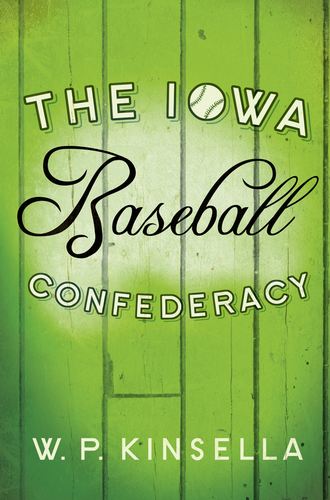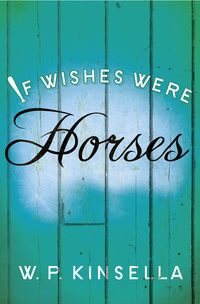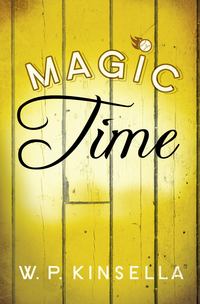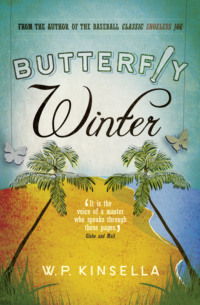
Полная версия
The Iowa Baseball Confederacy
‘You’re coming home with us,’ Mrs. Baron said. ‘You’re not going back to that big, lonely house. In fact, I think you should come and live with us. You can finish your schooling. Only thing is, you’ll have to walk a mile instead of a block to school.’ John Baron stood behind her, nodding his big, gray-thatched head.
‘I’ll bake you cookies,’ said Missy. ‘Gideon won’t be so sad if I bake him cookies, will he?’ she said to her mother, smiling her innocence, hopping a little in her excitement.
Missy bakes wonderful gingerbread cookies; always has. Marylyle was able to teach her how to mix the ingredients, divide the dough into small balls, flatten the balls with a rolling pin, make tracks in each cookie with the tines of a fork, and place the tire-tracked cookies on a greased cookie sheet ready for the oven. I’ve watched her countless times; she sings under her breath as she performs the ritual, concentrating, brows furrowed like those of someone puzzling over a mathematical problem.
‘You always make me feel good, Missy,’ I said to her and patted her arm.
I lived with the Barons for two years, until I finished high school in Onamata. I insisted on paying my own way. It was the least I could do.
It was during that time that Marylyle Baron told me what I call the oral history of Big Inning, Iowa. From her I learned that I wasn’t quite as different as I at first thought. I shared my stories of the Confederacy with her, and though she had no memory of the events I knew as fact, she was able to add some rather astonishing folk tales to my repertoire.
Drifting Away remembers the shining desert, the Dakota Hills roiling with green and silver grasses. Drifting Away fought beside Crazy Horse, rode with him into the wilds, shared his deepest dreams, was there when Crazy Horse’s only daughter, They Are Afraid of Her, lay dying, strangling on her own phlegm, not yet five years old.
Drifting Away was there when Crazy Horse died, murdered by a soldier named Gentles, held from behind by his traitorous brother, Little Big Man. With a knife blue as moonlight Drifting Away cut out the noble heart, carried it to Crazy Horse’s elderly parents, who buried it in the clear, sweet water of Wounded Knee Creek.
3
‘I think I’ll turn in,’ I said to the Barons, early on the evening after the funeral. I was just not able to face any more conversation, no matter how loving or concerned.
But in my room, between the crisp linen sheets, I could not sleep. I got up and dressed, then tiptoed down the hall and stairs like a burglar, carrying my shoes in front of me.
The sky was clear, the stars like tinsel, the soil still warm from the sun of the afternoon. I walked down the silent midnight roads, past the small Onamata Catholic Church, its spire the middle of a trinity of shadows; evergreens on either side of the church had grown to almost equal height. Along the roads, the corn stood crisp and blond, chittering like small rodents in a whisper of a breeze.
Onamata was quiet; the streetlights hummed. Above a hedge an occasional firefly twinkled; something scuttled in an overgrown yard. I let myself into the empty house. I went to my room and retrieved my horn from where it lay encased in fuschia-colored velvet in its old black case. The moon trickled over the horn, sparking until I might have been carrying golden water in my hand. I headed for the gentle elevation on the edge of town, where the land rises steadily up from the sleepy Iowa River. The river that night was so silent it might have been painted on the landscape. I climbed the easy slope I now knew had been the Big Inning baseball grounds. I knew that something terrible, something of history-changing magnitude, had taken place there. I walked on past the furthest reaches of center field, stopping on a precipice that must, long ago, have been a buffalo jump. I stood staring out at the rolling acres of corn, the pinprick of yard lights in a farmstead or two. Behind me was the eerie glow of Onamata, like a campfire just over a ridge.
I pointed my horn toward the sky and let it cry for me, let it translate my sorrow into notes. I played such a version of ‘Take Me Out to the Ball Game,’ the music plaintive as a loon’s call, the melody melancholy as taps. When I finished I rested for a few seconds, then went at it again, moving the tempo up to nearly normal but still soulful. Finally, knowing my father would not want me to grieve for long, I blasted it out with a Dixieland wail, as if I were playing during the seventh-inning stretch in front of a hundred thousand frenzied fans in a pennant-deciding game.
Once in the days after I moved back into my own home, before I met Sunny, I brought Missy Baron home with me to the cool, high-ceilinged kitchen with its tall cupboards and the rectangular, flat-bottomed sink. The sink boasted high steel faucets capped with porcelain. I made soup and grilled cheese sandwiches, a bachelor’s specialty. Mainly I wanted to see if Missy would be a party to any of the unusual goings-on in my kitchen. I think, too, I simply wanted some confirmation of what I had seen, something to let me know my obsession with the Confederacy was not tampering with my sanity.
We finished our meal, Missy being elaborately careful to spoon up the last few drops of her soup and to blot up the last crumbs of her sandwich with her middle finger.
‘You do a very good job of cleaning up your plate,’ I said. Missy smiled like sunshine.
‘Can’t let good food go to waste,’ she said, and I could hear Marylyle Baron’s tones echoing in Missy’s slightly nasal sing-song.
‘No, we can’t,’ I said. Then, ‘Let’s go sit in the sun porch.’
As we stood to leave the room, the water began gushing into the sink, the dish detergent gulped out of the bottle, and a froth of suds rose to the edge of the sink. The dishes, as if carried by invisible servants, floated to the sink and immersed themselves gently like children sliding into a bubble bath.
When the washing and rinsing were done, the plates, cups, and cutlery glided off like butterflies, each to its proper place on the shelves, and the cupboard doors and cutlery drawer closed softly.
Missy stood entranced the whole time. I was vindicated. What I saw was actually happening. When our eyes met, I was smiling from ear to ear, nearly bursting with excitement. I had never shared the mystery of it before. My father was always talking of the magic in the air, but I never knew how much of it he experienced. Until now, the dishes had performed their sleight of hand only when I was alone with them.
‘They rinsed themselves only once,’ Missy said, with deadly seriousness. ‘Mama says you rinse once to get the soap off and once to kill germs.’
If the eeries in my kitchen heard, they were not about to let on, though I imagined I heard a cupboard door tugged lightly shut, from the inside.
After the funeral, Missy did bake cookies, and I helped her. Sometimes I teased her gently by taking a fork and making a cross pattern on one of the cookies, or marking one well off center. Missy would pull her lips tight in exasperation; she became the mother, I the child. ‘Oh, Gideon, that’s not the way to do it,’ she would say, scowling. Then she would deliberately take the improperly marked gingerbread back, roll the fork marks out of it, and with extreme care redo it properly.
It was a good distraction for me, taking my mind off the death of my father and the multitudinous fund of information concerning the Iowa Baseball Confederacy that whirled and flopped in my head like clothing tumbling in a dryer.
Later, from the hallway, I listened to Missy splashing her bath water, giggling like a five-year-old. ‘Gideon, come see me sail my boat,’ she called between splashes.
And then from behind the door came Marylyle’s firm voice saying, ‘You’re too grown up for Gideon to see you in the bathtub.’
But I did hear her prayers. We all did. John Baron would stand just inside the white-trimmed doorway, in the room where ballerinas forever danced on the wallpaper and where a bed with a ruffled canopy sat against a far wall. He wore bib overalls and a black-and-red checkered shirt, his white hair combed in a high pompadour, his face wide and windburned. He appeared slightly uneasy, as if he feared he might drip oil on something. Missy knelt by the bed, her nightgown a riot of black-eyed Susans, her hair still damp from her bath.
‘Now I lay me down to sleep,’ Missy said.
My tribulations. Wealth is a tribulation. I was happy enough before I had it; the insurance agency always earned enough to pay the taxes on the house and keep us in food and a new pickup truck every few years. The only thing I’ve done with my new wealth is a little advertising. You’ve probably seen the ads I’ve run in everything from the Christian Science Monitor to the National Inquirer. The small ads ask that anyone having memories or any kind of information concerning the Iowa Baseball Confederacy contact me at a P.O. box in Onamata. I receive a lot of religious tracts, offers to sell me Rhine Valley cuckoo clocks, pamphlets on numerology, brochures advertising trips to Hawaii, and instruction on how to become a Rosicrucian. I’ve also discovered that the peace movement is heavily into junk mail. So far, I’ve received polite letters from a number of baseball experts, real and imagined, who tell me the IBC never existed.
The way I became wealthy was this. My mother, Maude Huggins Clarke, married a man named Beecher, who, it turned out, was indeed related to the Wrigleys, the Chicago Cubs, and several million dollars. He died when I was nineteen and, inexplicably, left no will. My mother was about to inherit everything – he had no relatives close enough to raise legal objections – when the executors of his estate discovered that Mother had children from a previous marriage. Because of some quirk in Illinois law, Enola Gay and I became heirs to his estate – fifty percent went to Mother, twenty-five percent to each of us.
They have never been able to pay Enola Gay her share, for by the time the legal entanglements took their course, Enola Gay had embarked on her career as an urban guerrilla. I don’t know if Enola Gay is aware that I have barely touched my inheritance; I would guess she is, however. Late at night the phone will ring, and though I suspect it is Enola, I always answer just in case it is Sunny. Enola wants me to give her some of my money, or to claim her share, which I am apparently legally entitled to do, and then pass the money on to her. I am interested in doing neither. I doubt that she was very kind to my cat, Shoeless Joe, in his old age.
‘Live in fear, you bastard,’ Enola Gay said to me the last time she phoned. It must be frustrating for her to be so near that much money, to have a cause she wants to give it to, and yet not be able to get her hands on it.
‘I think the FBI has a tap on the phone,’ I said to Enola, and she hung up.
My share of the money was deposited in trust with a law firm in Iowa City. I signed a power-of-attorney form; they invest the money, pay my taxes, and keep me informed as to how wealthy I am. I can’t think of a single thing I want that all my wealth can buy me. I want:
(a) Sunny to love me enough to stay with me.
(b) To vindicate my father and myself by proving the existence of the Iowa Baseball Confederacy.
(c) To do something for Missy Baron.
It doesn’t surprise me that none of the items on my list requires great wealth.
The cat. I would hug him and he would hang down the front of me like a big orange bath towel. When he was hungry, he would rub around my ankles, nearly knocking me down. I think I learned some of my indifference from the cat. He demanded to be fed, or petted, let in, or let out. When he got what he wanted, he was disdain incarnate. When he didn’t, he could be as obsequious as a dog.
When he was content he would lie on his back and let me squeeze his front paws gently, feeling the moccasinlike pads, flexing his claws in and out. He was warm, and almost adoring, soft as the velvet pillows on the back of the sofa in the living room.
Enola didn’t like Joe. I have never understood why she took him with her when I was going on six years of age. If she hadn’t taken my cat, I would have claimed her money, put it in a suitcase in small bills, and left it for her in a garbage can in some suburban Chicago park on a rainy night. When I told her that, she spit curses in my ear and hung up.
The men who cleared and leveled the land to create a baseball diamond on the outskirts of Big Inning often saw, or thought they saw, flashing like a deer through the fluttering poplars beyond the outfield, the figure of a giant Indian.
He loped beyond the poplar grove, knees raised high, back bent forward as if he were performing some ritual dance or high ceremony. Sometimes, in the clean morning air, as they bent picking roots, they would hear his voice, yipping like a coyote or trilling a plaintive birdcall. Other times, they only felt his presence. Occasionally on a humid afternoon the men would stop what they were doing, notice the all-encompassing silence of the land, the trees, the nearby river. One of them would shiver, though sweat tracked in rivulets down his face and chest.
‘Someone just stepped on my grave,’ he would announce, and laugh self-consciously.
Someone else would say, ‘That damn Indian is somewhere close. I can smell his ornery hide, but I can’t see him.’
Everyone would stand still in the stifling afternoon and stare around them. Then a bird would squawk or a horsefly would bite or a frog would sing from the riverbank, and everything would be back in order just as if the moment of silence had never happened.
Drifting Away, who had been near enough to smell the white men’s sweat, near enough to reach out and touch their glistening wet backs, disappeared into the poplars, chuckling softly as a breeze.
‘Walt “No Neck” Williams, do you remember him?’ my friend Stan asks suddenly, in the way he has of jumping from subject to subject.
We are with our wives, driving back from a night game in Cedar Rapids.
‘Mm-hmm,’ I say noncommittally. ‘I know the name, but the details are fuzzy. He ended up playing in Japan, didn’t he?’
‘He played for the Sox. The White Sox. They called him No Neck because he didn’t have one.’ Stan laughs his long, stuttering laugh, sounding as if he has peanut shells lodged in his throat. There is a car following us closely and the headlights bury themselves in the rearview mirror, which then paints a moonlight-like bar across Stan’s face. As I glance across the front seat at him he looks as though he is wearing a golden mask.
‘Last summer I met No Neck Williams on the street in Chicago,’ Stan goes on. ‘I just about went crazy. “Hey, No Neck,” I called to him, and I set down my suitcases and went running after him.
‘You remember that, Gloria?’ He directs the last words at his wife, turning toward the back seat to acknowledge her, the mask of light slipping around his ear as he does.
Gloria is a big, blowzy Polish girl, cheerful and resilient. She has so far fouled off all the curves life has thrown at her, though I notice that her brows have squeezed together in a mini-scowl, as if she has been staring too long at the horizon.
‘He actually edged away from me. You remember that, Gloria? I guess you must meet a lot of nuts when you’re in the Bigs. I mean, I kept sayin’ to him, “Man, I used to watch you when you played for the Sox. You were great, man. You were great.” And I hauled out my wallet and looked for something he could sign, and I didn’t have any paper, not even a Master Charge slip or anything, so I got him to sign the back of Gloria’s picture. It’s one I’ve carried around for ten years, with Gloria in jeans and her hair up in a beehive, standing beside her old man’s ’69 Buick. No Neck looked at me like I was crazy, leaving my wife with our suitcases and chasing after him for a block like that. Don’t you remember him, Gid?’
‘I don’t get involved with modern-day players the way you do, Stan.’
My wife, Sunny, is squashed into the corner of the back seat behind me. She hasn’t said a word since we left the ballpark in Cedar Rapids. I catch a glimpse of the red glow of her cigarette. She is tiny as a child, sitting back there. I wonder how someone so small and insignificant-looking can tear me apart the way she does.
‘No Neck’s only a couple of years older than us, Gid,’ Stan says. ‘Played his last game in the Bigs in ’75. You know how that makes me feel? A guy just two years older than me, retired. And me still strugglin’ to make the Bigs?’
‘You’ll make it, Stan,’ I say automatically, just as I have been saying every year for over half my life.
Stan and Gloria have come to visit Gloria’s mother in Onamata; she’s the only family either of them has here anymore. Stan’s father is dead and his mother has gone to Florida to live with a married sister.
Since spring, Stan has been playing Triple A ball in Salt Lake City, but he sprained his right hand pretty badly a couple of weeks ago and the club put him on the disabled list and brought up a kid from a team in Burlington, Iowa, to replace him.
‘I wanted to ask No Neck how much he practiced. I bet he practiced like crazy or he never would have got to the Bigs. God, but I used to practice. Remember how I used to practice, Gideon? Gloria? Hey, Sunny, you’re bein’ awful quiet. I ever tell you how I used to practice?’
Sunny draws deeply on her cigarette but does not answer.
Stan is tall and muscular, his head square, his hair cut short, but his face is wide and innocent as a husky child’s. His eyes are pale blue and wide-set; his hair, though it’s darker now, was a lemony color when we were kids, and Stan was forever watering it, as if it were grass that would grow stronger when wet.
‘My old man never liked baseball, but I used to make him come outside and he’d stand in front of the barn, and I’d make him hit fly balls to me. I spent all my pay on baseballs – all the money I earned working for Old Piska, the cement contractor. Saturdays I used to carry a bucket of cement in each hand, from the mortar box to the sidewalk we were laying, or the garage floor. I took the money I earned and bought a box of baseballs, a whole dozen.
‘I laid them out on my bed like a bagful of white oranges, and I smelled them and touched them and handled them like a miser handling his money. Too bad I couldn’t have made real ones the way we made balls to play in your back yard, eh Gideon? God, they used to stink, but it was fun.
‘Speakin’ of stinking, the old man wasn’t a very good batter, and every once in a while he’d foul one into the goddamned pigpen. I’d have to wash the pigshit off it, and sometimes when I went into the pen, one of those big red buggers would have the ball in his teeth, and I’d have to whack his snout to make him let go, and then the ball would have tooth marks on it forever.’
Stan stops for a second or two. The highway is dark. There is an orange flash behind me as Sunny lights a new cigarette. I see that her left eye is closed, squinted up against the smoke. There is an inch-long scar, pink as a worm, on her dusky skin, running vertically from the corner of her eye onto her cheekbone. There are fine age lines spreading out from the corners of her eyes. Sunny aged a good deal the last time she was away.
‘I love the game, I’ve always loved the game, right, Gid? I used to dream about a career in baseball. It wasn’t just vague hopes like a lot of kids have. I knew what I was doing. I’ve made a living from the game for almost fifteen years. And I’m gonna make the Bigs yet, you wait and see.’
‘You’ll make it, Stan. We know that,’ I say.
‘I mean, I’ve seen guys with twice as much talent as me throw it all away. They party all night and stagger in ten minutes before a game, wearing their hangovers like badges. It’s not fair that my reflexes are one one-hundredth of a second slower than theirs. I mean, I work out three hours every afternoon. I’ve always hustled, haven’t I, Gid?’
‘You’ve always hustled,’ says Gloria from the darkness. Her voice is lifeless. She answers by rote. She, like me, has learned to agree with Stan without even listening to him.
‘And I put a washtub on its side, used it for home plate. I’d make the catch and rear back, and I got so I could hit that tub on the first or second bounce about nine times out of ten. You know what the difference is between the Bigs and the minors?’ Stan waits only one beat, not expecting a reply. ‘Consistency. The whole thing is consistency. There are players in the minors who make spectacular plays and hit the ball just as hard as in the majors, but the guys in the Bigs are more consistent. They make the plays not just nine out of ten times but ninety-nine out of a hundred.’ He pauses thoughtfully for a moment. ‘You know, I’d hit that tub nine out of ten times, but the tenth one might end up thirty feet down the line, or hit the barn door fifteen feet in the air, making a sound like a gun going off. Hey, Gideon, how about you come out and hit me some flies in the morning?’
When we got home after the game, I kissed Sunny gently and pulled her against me. Her lips were dry and she made them thin and did not return my kiss. I did everything I could think of to please her. I touched her with my finger tips, gently undressed her, massaged her, fondled her, loved her with my hands, my tongue, held back my own passion, waited for a response from her, received none.
I remember once, at a time like this, when Sunny was in one of her moods, she said something bitter, something designed to make me hate her.
‘Can’t you tell by the way I touch you that I love you?’ I said.
‘No,’ said Sunny, precipitating a long silence.
Eventually I made love with her. Her body was unpliant, mannequin-like. I wanted so desperately to rouse her, I controlled myself carefully, rocked her gently for a long time, until our bodies were slick and delicious.
‘Can’t you finish up?’ Sunny said, not even in a whisper. ‘I’m tired.’
If she had known how close I came to killing her then, it would have made her happy.
I threw myself off her without a word and lay like a rock in the darkness, my body taut, nerve ends twitching. Late in the night I heard her leave. I woke to the tinkling of hangers in our closet, knew she was packing a few blouses, a couple of pairs of jeans, in the same battered suitcase she arrived with twelve years ago. I lay, tense as piano wire, afraid to speak, afraid not to. She closed the front door quietly; I listened to her tiny footsteps descend the stairs, fade away as she moved down the sidewalk.
Конец ознакомительного фрагмента.
Текст предоставлен ООО «ЛитРес».
Прочитайте эту книгу целиком, купив полную легальную версию на ЛитРес.
Безопасно оплатить книгу можно банковской картой Visa, MasterCard, Maestro, со счета мобильного телефона, с платежного терминала, в салоне МТС или Связной, через PayPal, WebMoney, Яндекс.Деньги, QIWI Кошелек, бонусными картами или другим удобным Вам способом.






